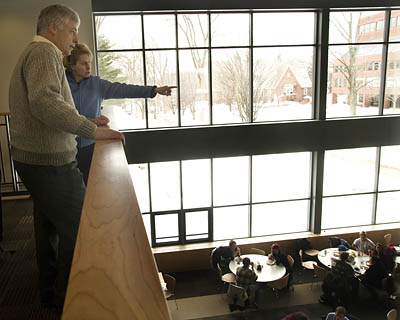
A year later, U.S. Rep. Michaud inspects completed Commons
![]()

U.S. Rep. Michael Michaud views the new Bates College dining Commons from the facility's second level during a tour with Dining Services Director Christine Schwartz.
About a year after visiting Bates to see how the college is making itself more sustainable, U.S. Rep. Michael Michaud returned on March 7 for lunch and a tour of Bates’ new, “green” dining Commons.
The Democratic congressman from the Second District spent about an hour in the attractive new facility, which opened in February. Part of a $30 million construction project that also included Bates’ new cross-campus Alumni Walk, the Commons was designed to conserve water, heat and electricity, and to facilitate sustainable practices such as recycling.
Michaud was accompanied by Dining Services Director Christine Schwartz and Vice President for External Affairs William Hiss ’66. Joining the group were Paul Suitter ’09, president of the Bates College Democrats, and Liz Murphy ’10, also a Bates Democrat. The students are interning in Michaud’s Lewiston office this term, and Suitter will intern in Michaud’s Washington office this summer.
The congressman enjoyed a bowl of clam chowder while learning about the innovative facility from Hiss, Schwartz and the students. “It was a real pleasure to return to Bates today to visit the new dining hall,” Michaud said after the tour. “When I visited the campus a year ago on my ‘green’ tour of Bates, I was delighted to see that the college was moving in the right environmental direction. I saw the beginnings of two anchor environmental construction projects – the new dorm on College Street, and the new dining hall.
“Today, I had the pleasure of touring the new dining facility and of sharing lunch with some students. The building itself exceeded all of my expectations in terms of its lack of environmental impact, and the food was delicious. I congratulate Bates and Dining Services for their forward thinking and innovation.”
The Commons is “green” in many ways. Ample access to daylight and occupancy sensors that control room lighting help control energy consumption. “Dual-flush” toilets can reduce water for flushing by two-thirds. Recycled and certified-green building materials were used in the structure’s construction, and its design facilitates recycling of a variety of materials during the everyday use of the building. The building’s summer ventilation is primarily natural — air is cooled mechanically only in the hottest parts of the kitchen.
In recent years, the College has taken major steps to reduce its impact on the environment. Opened last August, the new student residence boasts sustainability features that minimize water, heat and electricity use, reduce stormwater impacts and encourage students to recycle. In 2005 Bates committed itself to purchasing its entire electricity supply from renewable energy sources in Maine, specifically biomass generating plants and small hydroelectric producers.
In February 2007, Bates President Elaine Tuttle Hansen signed the American College & University Presidents Climate Commitment, adding Bates to more than 100 colleges and universities nationwide (now nearly 500) that have agreed to become “carbon neutral.”
(Read more about the new dining Commons.)




